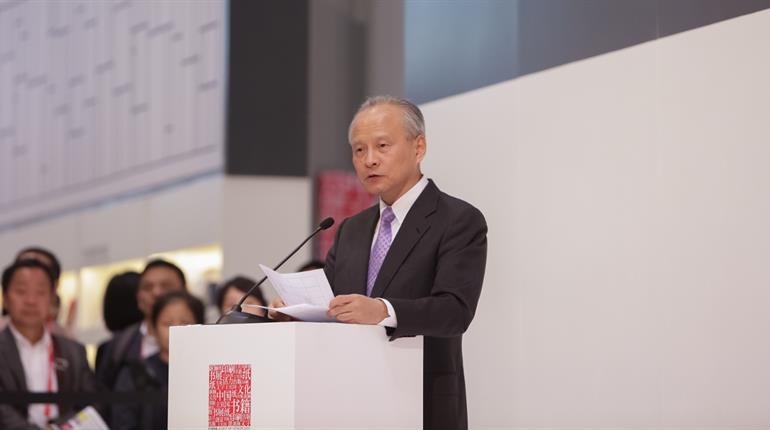An international tribunal’s ruling denying China’s claims in the South China Sea will “intensify conflict and even confrontation,” Beijing’s ambassador to the United States said on Tuesday.
The ambassador, Cui Tiankai, also told an international forum in Washington that Beijing remains committed to negotiations with other parties in disputes over the vital trade route.
In a case that was seen as a test of China’s rising power and its economic and strategic rivalry with the United States, the Permanent Court of Arbitration in The Hague ruled China had breached the Philippines’ sovereign rights by endangering its ships and fishing and oil projects in the energy-rich region.
The Chinese diplomat blamed the rise in tension in the region on the United States’ “pivot” toward Asia in the past few years. Cui said the arbitration case “will probably open the door of abusing arbitration procedures.
“It will certainly undermine and weaken the motivation of states to engage in negotiations and consultations for solving their disputes,” Cui said. “It will certainly intensify conflict and even confrontation.”
China boycotted the arbitration hearings and described them as a farce. Legal experts and Asia policy specialists said China risked violating international law if it continued to strike a defiant tone and ignored the ruling.
The United States, which China has accused of fueling tensions and militarizing the region with patrols and exercises, said the ruling should be treated as final and binding.
“We certainly would urge all parties not to use this as an opportunity to engage in escalatory or provocative action,” White House spokesman Josh Earnest told reporters in a briefing.
The ruling is significant as it is the first time that a legal challenge has been brought in the dispute. The court has no power of enforcement, but a victory for the Philippines could spur Taiwan, Vietnam, Malaysia and Brunei to file similar cases on their claims to the waters.
China’s Foreign Ministry rejected the tribunal’s ruling, saying its people had more than 2,000 years of history in the South China Sea, that its islands did have exclusive economic zones and that it had announced to the world its “dotted line” map in 1948.
Ambassador Cui told the CSIS forum that China “will do everything possible to safeguard the unimpeded flow of commerce and stop any attempt to destabilize the region.”
The Philippines said it was studying the ruling.
“We call on all those concerned to exercise restraint and sobriety,” Foreign Affairs Secretary Perfecto Yasay told a news conference.
U.S. State Department spokesman John Kirby said Washington has seen signs in recent weeks of continued militarization by China in the South China Sea.
President Barack Obama’s top Asia policy adviser, Daniel Kritenbrink, said the United States had no interest in stirring tensions in the South China Sea as a pretext for involvement in the region.
“We have an enduring interest in seeing territorial and maritime disputes in the Asia Pacific, including in the South China Sea, resolved peacefully, without coercion and in a manner that is consistent with international law,” Kritenbrink said at a forum of the Center for Strategic and International Studies (CSIS).
Copyright Ships & Ports Ltd. Permission to use quotations from this article is granted subject to appropriate credit given to www.shipsandports.com.ng as the source.

